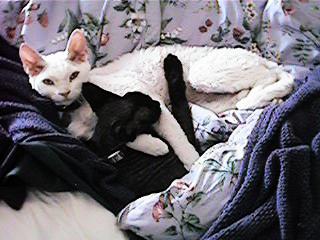I've got a boy in my lap who's tired but happy to be held, so we'll try typing around him and see what happens.
In my past life as a technical writer, I was subjected to criticism on my work, well, daily. I realized this week that it's inoculated me against criticism masquerading as critique. Critique is specific, kind, and meant to help. Criticism is vague and not helpful.
There's a writer in our group who I referred to earlier in this blog as a prat. After I read my story, he began his comments with, "Well, this first paragraph needs a lot of work." He said it with the tone of a contractor surveying fire damage, so sorry to tell you, it's worse than you think and it will cost a bundle. Weaker souls than me would have cried.
On reading the paragraph aloud, I realized I had an ambivalent pronoun (that other people in the group had already discussed), but as far as paragraphs go, the paragraph was pretty tight. My writing (not on a blog) is terse.
I turned to him and asked: "Could you be more specific?"
He hemmed and hawed. "Well, no, sorry. You've got four characters introduced here, and well, okay, four sentences, and this pronoun's confusing..." The other people in the group had a problem with the last sentence since it was delicately worded and had to read it twice, but I'm okay with that. The writers I love often make me read a sentence twice to figure it out and I'm happy to be in their company, or in their anteroom, anyway.
I looked at him, and not with my evil glare of death. This was my editorial, I'm happy to do anything you ask but if you can't ask I can't possibly help you look. It's pretty friendly. "Anything else?"
Nope. "Alrighty then." Then he went through a laundry list of things, one of which was actually good and the rest were kind of blah. And I realized: there is serious power in being able to say, is that all? Anything else? You've offered your harshest criticism and I'm not even blinking, in fact, I want more details about how much I suck and why. No? Okay, who else wants a go at me?
Anyway, after he read his story, I realized he's probably a sci-fi computer geek like many others I know who doesn't have social graces and is used to being the best writer in the room. I think he's only used to sharing his stories with adoring audiences. I have my own adoring audience too, but I also know they're not necessarily good for the unvarnished truth.
There were many aspects of his story that we asked clarifying questions about that he would answer with, "Do you want me to tell you or do you just want to read the story?" This is a response I've had, but I think he used it because he didn't fully understand what we were asking some of the time. There are questions about story and questions about technique, and sometimes you can answer a technique question with a story answer, but that doesn't help identify the technique issue.
He sent the story last night. Full disclosure: I read very little sci-fi on my own. I'll read anything that comes into this house, but past Dune and the Orwell/Huxley dystopia canon, there's not a lot of sci-fi on my own shelves. So maybe I'm not the audience. But the story doesn't actually seem to have a story. There's no character arc, the conflict was unbelievable and not that bad in terms of conflict, the "redemption" of who I can only guess is the protagonist is really silly, there's no come-uppance for the "villain" who I identified most with in the end anyway. Add in so many, many cliches and I don't know how to comment on this story.
Now I struggle with what to say in an email. He requested general feedback and no "pickys" whatever the hell a picky is. A typo, maybe? I read it again this morning to see if it made more sense and it didn't. I might call in a consult with my in-house sci-fi expert.
But the rest of the group was fabulous, supportive but insightful and kind. I'm looking at this email as part of training the sci-fi guy to be less "I am super writer, tremble before my insights!" and more like someone who gives good critique.
Subscribe to:
Post Comments (Atom)

No comments:
Post a Comment